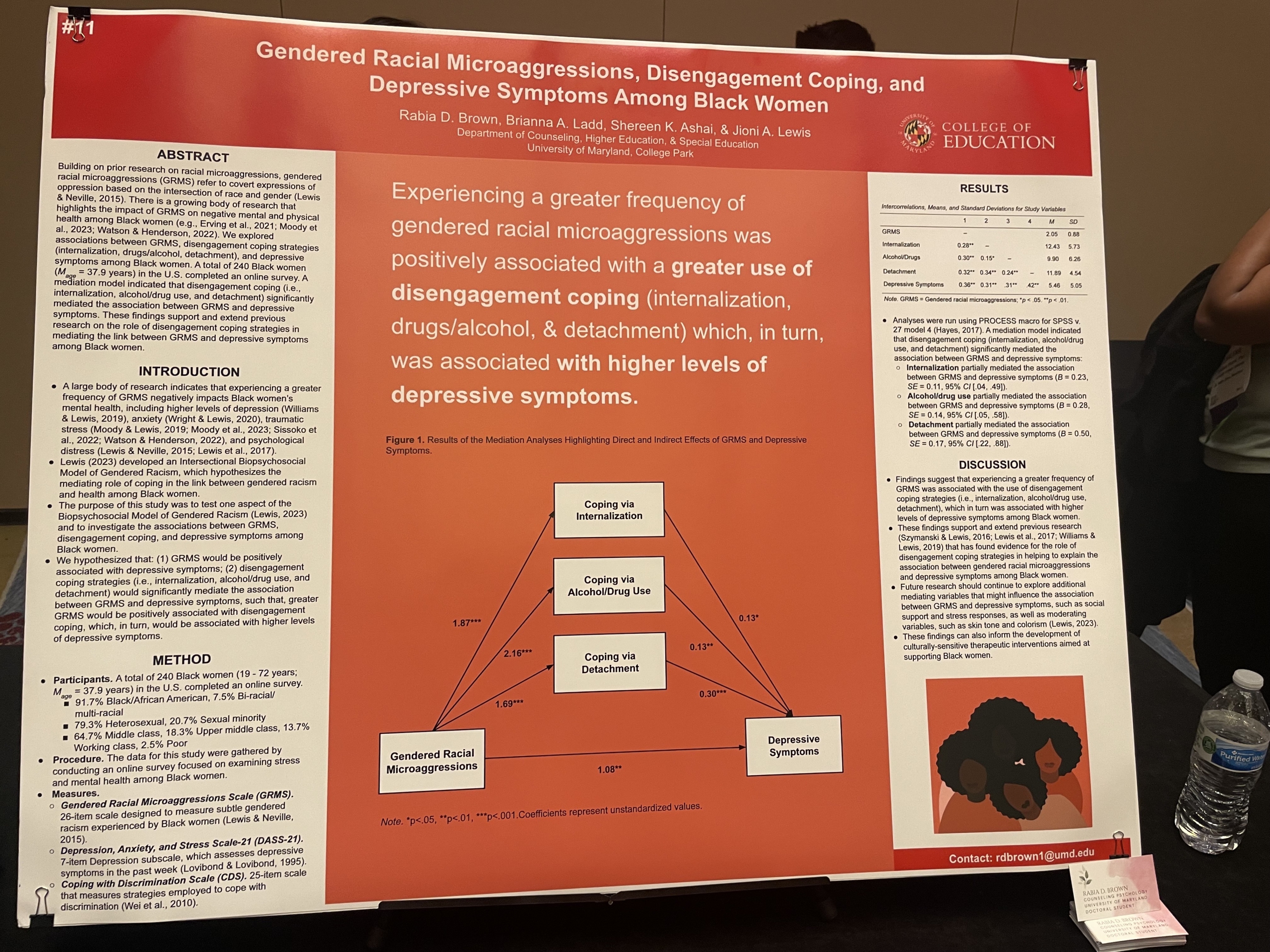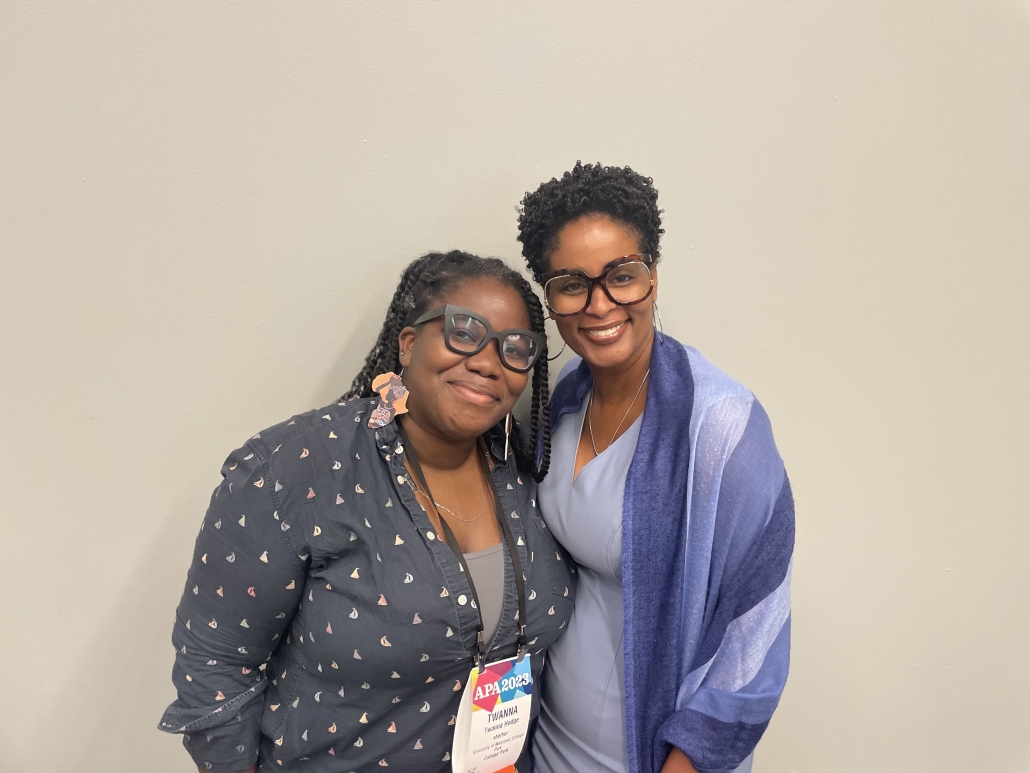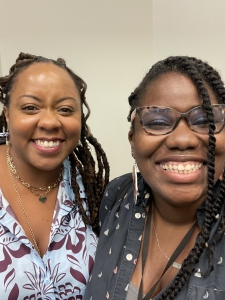We Belong Here: An APA Annual Meeting First-Time Attendee Experience
by Twanna Hodge, PhD Student
I had the fantastic opportunity to attend my first American Psychological Association (APA) Annual Convention in Washington, DC, from Thursday, August 3rd, to Saturday, August 5th, thanks to professional development support from the American Library Association Office for Diversity Literacy and Outreach Services Spectrum Doctoral Fellows Development Fund. The American Psychological Association (APA) “is the leading scientific and professional organization representing psychology in the United States. Their mission is to promote the advancement, communication, and application of psychological science and knowledge to benefit society and improve lives.” This year’s theme was You Belong Here.

Going to the conference gave me the chance to grow in my key research area–mental health literacy and mental health information behavior. I was able to participate in sessions focused on mental health, equity, anti-racism, and inclusion to learn about current psychology trends, issues, and interventions, and to network with current psychology students and professionals. I attended the Presidential Opening Session, Information Exchange on Understanding Digital Treatments: Why All Mental Health Apps Are Not Created Equal, Experiences and Solutions in the Face of Resistance to EDI Efforts, Perinatal Mental Health, Beyond white space and white time: Dismantling anti-Blackness in Research and Practice, and more. During the poster session, I met several UMD PhD students conducting research focused on Black women.
Poster: Gendered Racial Microaggressions, Disengagements Coping, and Depressive Symptoms Among Black Women by Rabia D. Brown, Brianna A. Ladd, Shereen K. Ashai, & Jioni A. Lewis
During the Presidential Opening Session, Dr. Thema Byrant (the current president of APA) talked about the impacts of omission and silencing in knowledge production and racism within the psychology field and the damage that it had on racially marginalized communities, including referencing the Apology to People of Color for APA’s Role in Promoting, Perpetuating, and Failing to Challenge Racism, Racial Discrimination, and Human Hierarchy in U.S. Furthermore she positioned us to think about sustainable psychology and healing psychology. Understanding Digital Treatments: Why All Mental Health Apps Are Not Created Equal covered an introduction to digital interventions for mental health, such as clinical and evidenced-based prescriptive digital therapeutics, and more.
On Friday, I joined the Society for the Psychology of Women’s session on Perinatal Mental Health chaired by Dr. Jameta N. Barlow (George Washington University), panelists included Dr. Karen Sheffield-Abdullah and Dr. Jioni A. Lewis. Participants critically interrogated their practice and knowledge of truly connecting with and serving Black birthing people by wrestling with questions such as, “Are the assessment scales picking up the symptoms of diverse communities?”; “How can we (psychologists) work to make changes in Black birthing outcomes?”; and “How do Black people define safety and protection?” I was introduced to the concepts of Superwoman Schema and Network Stress (refers to perceived stress related to stressors in the lives of family members, friends, or other loved ones (Woods-Giscombé et al., 2015).
I had the absolute pleasure to meet the illustrious Dr. Karen Sheffield-Abdullah (presenter). Dr. Sheffield-Abdullah was recently featured on NPR’s All Things Considered, sharing information about the Black Maternal Mortality Crisis.
Twanna Hodge (left) and Dr. Karen Sheffield-Abdullah (right)
In the Beyond White Space and White Time: Dismantling Anti-Blackness in Research and Practice session, Dr. William Ming Liu, Dr. Matt J. Miller, Richard Shin, Sangida Akter, Silvia Serrano, Blake Turner, Marquette University, Rolonda L. Payne, EdD, Carlton Green Timea Webster; Jazmin Pichardo, Rossina Zamora Liu, Crystal J. Charity, MA, Cambria Conley, Lei Danielle Escobal, Vi Bao Le, and Jessica Nguyen presenters discussed Black life-making, epistemic violence, positionality as self-knowledge, Black liberation education, and engaging in meaningful healing.
The Saturday session on Exploring Racial and Ethnic Socialization Among Black Immigrant Emerging Adults, deepened my understanding of the concepts of Triple Consciousness, navigating white culture, Black racial identity, immigrant identity, and preserving ethnic identity. Presenters shared the following questions: What messages are being transmitted to emerging adults from the media, family, friends, etc.? What are the messages you (attendees) received growing up about your racial and ethnic identities? How are teachers talking about race and ethnicity?
I also had the chance to meet the amazing Dr. Della Mosley, a scholar-activist, and much more.
Dr. Della Mosely (left) and Twanna Hodge (right)
As an Afro-Caribbean second-year doctoral student and librarian surrounded by clinicians attending APA, it reaffirmed my choice to learn more about mental health literacy from an information studies perspective. It was overwhelming at points when jargon was used or referred to experiences only clinicians have, but overall, it was a good challenge for me to attend this conference as a budding interdisciplinary scholar to gain insights on current trends and foci.
At this conference, it was the first time I had ever heard anyone say outright that, “colonialism is a social determinant of health”- something I have never consciously considered, but I agree with. It was wonderful to take in great information, gain access to a plethora of resources, and join in discussions during and after the sessions. I felt the love for library workers! Fellow attendees were very welcoming and complimentary when I mentioned that I am a librarian.
The three pieces of advice I would give to a first-time APA doctoral student attendee is to plan out your schedule in advance (identifying which sessions you are interested in but choosing at least one outside of your focus area), go to socials/poster sessions/the first-time attendee events to meet with new folks in order to network to build your networks and professional communities, and take the time to take care of yourself so set aside some time to explore the area, eat some delicious food and take a nap.
The next conference will be in Seattle, WA in 2024. Will I be in Seattle to attend the next conference? Check back here to find out!
I recommend that current students attend their disciplinary and other related discipline conferences if they can because the benefits are plentiful.
For more information, check out the APA 2023 highlights.
My conference attendance was made possible by the American Library Association Spectrum Doctoral Fellowship program.
2023 APA Conference Program Schedule
References
Woods-Giscombé, C. L., Lobel, M., Zimmer, C., Wiley Cené, C., & Corbie-Smith, G. (2015). Whose stress is making me sick? Network-stress and emotional distress in African-American women. Issues in mental health nursing, 36(9), 710-717.



